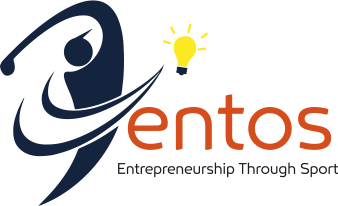ENTOS research shows that there are other trends and theories that recognize how physical activity reinforces other competences development, like Cooperative Learning and Neuroscience.
The project partners have started the Research of ENTOS project (IO1) looking at Best Practices, Case Studies, other Projects and Academic Researches carried out on the capability that sport has to develop the Entrepreneurship Competence.
The objective of the ENTOS Research is to register the state-of-art regarding the association of sport to learning processes, especially if connected with the development of the Entrepreneurship Competence (one of the 8 Key Competences for Lifelong Learning) looking at these studies keeping in mind the the EntreComp framework, developed by the Joint Research Centre of the European Commission in 2006, that can be applied to different fields of life, and not only for starting a business.
At this very early stage, we can already disseminate the first results of the Research conducted in Spain, where there are interesting trends and theories that associate the benefit of sport in supporting the development of the Entrepreneurship Competence, but only partially, like the case of social inclusion, teamwork, and few more.
Sport is seen as a meaningful tool of the very famous Cooperative Learning teaching methodology, normally based on project work, that can empower even more the teamwork of students, their goal orientation and communication skills, as well as their understanding of the roles in the group and the importance of being responsible.
Researchers recognize that movement supports students to learn in a more effective way and to acquire more information and for longer in time. Neuroscience applied to sport is also a recent discovery of the benefits for the development of other skills, like using effective strategies, planning skills related to the environment characteristics, decision-making, time-management, strategic thinking. Furthermore, all these aspects positively influence self-esteem and the communication skills of young people. There are universities that are even investing in offering Master courses to empower physical education teachers, and other sport trainers, to acquire these teaching capabilities. A very good example is done by the Master offered by TECH España named “Neuroeducation and Physical Education”.
Karin Callipo e Claudia Esposito
EU Project Managers at Education In Progress SPAIN
Sources:
- José Gómez, “Neurociencia cognitiva y educación” Fondo Editorial FACHSE, Ciudad Universitaria de Lambayeque, Perú Compilación, 2004.
Melchor Gutiérrez San Martín, “Desarrollo de valores en la educación física y el deporte”, Miscelanea, 2014. - Maurício Marques, Catarina Sousa, Jaume Cruz Feliu, “Estrategias para la enseñanza de competencias de vida a través del deporte en jóvenes en riesgo de exclusión social”. Apunts. Educación Física y Deportes 2013, n.º 112, 2.º trimestre (abril-junio), pp. 63-71.
Melchor Gutiérrez San Martín, “Desarrollo de valores en la educación física y el deporte”, Miscelanea, 2014. - “Neuroeducación y Educación Física”, Master course online offered by TECH Institute and Universidad Cardenal Herrera, available at https://www.techtitute.com/educacion/master/master-neuroeducacion-educacion-fisica







